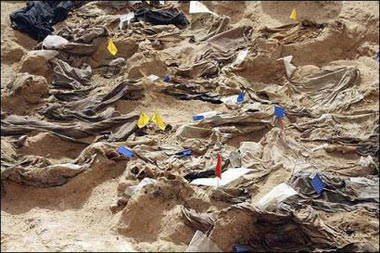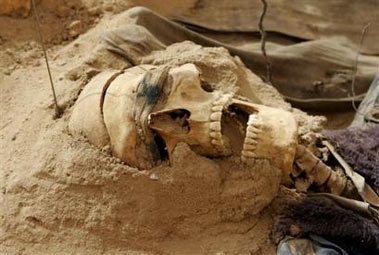
Human
skeletons and clothes from persons allegedly executed during the regime of
former President Saddam Hussein and now unearthed in a shallow mass grave,
in a remote desert south of Baghdad. The trial of Saddam and seven
co-defendants for crimes against humanity held a brief session before
adjourning until next week as the judge criticized the defense for
dragging its feet. [AFP] |
Skeletons, many still clothed and wearing blindfolds, jut out from the desert
sands in southwestern Iraq where forensics experts have unearthed at least two
mass graves of victims from the brutal suppression of a 1991 Shiite uprising.
The chief investigative judge in Saddam Hussein's trial, Raid Juhi, said they
have documented evidence of more than 100,000 victims of the crackdown against
Shiites in the wake of the 1991 Gulf War and unofficial accounts showing the
number could be as high as 180,000.
"When the whole search is done, we could announce a number of mass graves and
of victims," Juhi said during a visit Saturday to the grave sites, according to
a pool report. "Some people were loaded on buses and taken somewhere and those
vehicles and buses came back with no people on them."

A human
skull with blindfold still on lies on a mass grave containing human
skeletons and clothes from persons allegedly executed during the regime of
former President Saddam Hussein and now unearthed in a shallow grave, in a
remote desert south of Baghdad in Iraq Saturday, June 3, 2006. U.S.
forensic expert and project director Sonny Trimble said they have found 18
grave sites, with two of them already excavated so far. [AP
Photo] |
Saddam and seven co-defendants are on trial for the killings of more than 140
Shiites following a 1982 assassination attempt against him in the town of
Dujail - the first of what Iraqi authorities say could be up to a dozen
proceedings. Saddam could face death by hanging if convicted in the Dujail case.
But President Jalal Talabani, a Kurd, has said he doubted any sentence would be
carried out until all trials were complete.
Juhi said there were more than 70 defendants in custody in connection with
the 1991 Shiite uprising, including some who were in key positions during the
former regime and others in minor positions.
He would not provide names, except to say that Saddam and his cousin, Ali
Hassan Majid, known as "Chemical Ali," had been questioned by the investigation
team.
Meanwhile, forensics experts and archaeologists are painstakingly searching
for remains to provide direct evidence to the Iraqi High Tribunal, which is
overseeing the cases against Saddam.
"This whole project is for the 1991 uprising and the killing of the Shiite
people," said Michael Trimble, a 53-year-old forensic psychologist from St.
Louis, who set up camp with about 120 people amid heavy security about three
weeks ago. "We've located two sites so far and we are in the process of testing,
I think, 22."